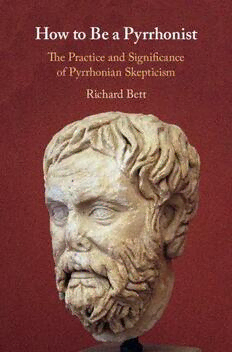Table Of ContentHOW TO BE A PYRRHONIST
What was it like to be a practitioner of Pyrrhonist skepticism? This
important volume brings together for the first time a selection of
Richard Bett’s essays on ancient Pyrrhonism, allowing readers a
better understanding of the key aspects of this school of thought.
The volume examines Pyrrhonism’s manner of self presentation,
including its methods of writing, its desire to show how special it
is, and its use of humor; it considers Pyrrhonism’s argumentative
proceduresregardingspecifictopics,suchassigns,space,ortheModes;
and it explores what it meant in practice to live as a Pyrrhonist,
includingthekindofethicaloutlookwhichPyrrhonismmightallow
and, in general, the character of a skeptical life and how far these
mightstrikeusasfeasibleordesirable.ItalsoshowshowPyrrhonism
often raises questions that matter to us today, both in our everyday
lives and inour philosophical reflection.
is Professor and Chair of Philosophy at the
Johns Hopkins University. His translations of works by Sextus
Empiricus include Against the Logicians (Cambridge, ) and
Against thePhysicists (Cambridge, ), and he is also the editor of
TheCambridgeCompaniontoAncientScepticism(Cambridge,).
HOW TO BE A PYRRHONIST
fi
The Practice and Signi cance of Pyrrhonian Skepticism
RICHARD BETT
TheJohnsHopkinsUniversity
UniversityPrintingHouse,Cambridge,UnitedKingdom
OneLibertyPlaza,thFloor,NewYork,,USA
WilliamstownRoad,PortMelbourne,,Australia
–,rdFloor,Plot,SplendorForum,JasolaDistrictCentre,NewDelhi–,India
AnsonRoad,#–/,Singapore
CambridgeUniversityPressispartoftheUniversityofCambridge.
ItfurtherstheUniversity’smissionbydisseminatingknowledgeinthepursuitof
education,learning,andresearchatthehighestinternationallevelsofexcellence.
www.cambridge.org
Informationonthistitle:www.cambridge.org/
:./
©RichardBett
Thispublicationisincopyright.Subjecttostatutoryexception
andtotheprovisionsofrelevantcollectivelicensingagreements,
noreproductionofanypartmaytakeplacewithoutthewritten
permissionofCambridgeUniversityPress.
Firstpublished
PrintedandboundinGreatBritainbyClaysLtd,ElcografS.p.A.
AcataloguerecordforthispublicationisavailablefromtheBritishLibrary.
----Hardback
CambridgeUniversityPresshasnoresponsibilityforthepersistenceoraccuracy
ofURLsforexternalorthird-partyinternetwebsitesreferredtointhispublication
anddoesnotguaranteethatanycontentonsuchwebsitesis,orwillremain,
accurateorappropriate.
Contents
Preface page vii
Acknowledgments xiv
List of Abbreviations xvi
The Pyrrhonist’s Dilemma: What to Write If You Have
Nothing to Say
Why Care Whether Skepticism Is Different from
Other Philosophies?
Humor as Philosophical Subversion, Especially in the Skeptics
:
The Sign in the Pyrrhonian Tradition
Aenesidemus the Anti-Physicist
The Modes in Sextus: Theory and Practice
What Kind of Self Can a Greek Skeptic Have?
How Ethical Can an Ancient Skeptic Be?
Living as a Skeptic
v
vi Contents
Can an Ancient Greek Skeptic Be Eudaimôn (or Happy)?
And What Difference Does the Answer Make to Us?
On Pyrrhonism, Stances, and Believing What You Want
Can We Be Ancient Skeptics?
Bibliography
Index Locorum
Index
Preface
Like many scholars whose careers are at a relatively advanced stage, I have
published quite a few essays in scattered locations. Many of these came
from invitations to participate in conferences and were published in
volumes that resulted from those conferences, volumes that are often
obscure and not widely available. In addition, a few of them have previ-
ously been available only in a language other than English.
While I have written on a variety of philosophers and schools of
philosophy, the fact is that it is ancient Greek skepticism with which
I am principally associated in the scholarly world, and this is no accident;
all of my book-length publications, including translations of Sextus
Empiricus, and a clear majority of my articles have been on some aspect
of skepticism. And this has led to a self-reinforcing tendency: because
I have become known as a specialist in this area, I am more likely to be
invited to contribute papers on skepticism than on anything else, and
I have generally been happy to oblige. So a substantial body of papers on
Greek skepticism has grown up over the years, and I started to think it
wouldbeagoodideatobringagroupofthemtogetherinasinglevolume.
I have also found that many of my essays on ancient Greek skepticism
shareanumberofrecurringthemes.Ithereforethoughtaselectionofthese
essays published together in a single volume would serve two purposes:
first, it would allow the more obscure to become better known, and
second, bringing them all together would serve to highlight themes that
I have touched on repeatedly from different angles, and that seem to me
important.
It was not easy deciding which essays to include and which to leave
out – and I received a lot of help on this, on which more later. But
explaining how the volume took the shape that it did may be helpful in
giving readers a sense of what I hope will be its contribution to the field.
MyreputationasaspecialistinancientGreekskepticismfirstarosemainly
as I worked out a comprehensive picture of the development of the
vii
viii Preface
Pyrrhonist skeptical tradition, from Pyrrho himself through Aenesidemus
toSextusEmpiricus.ThisculminatedinmybookPyrrho,HisAntecedents,
and His Legacy (). This aspect of my work is well known, and so
I thought the new volume should largely avoid this familiar ground. In
fact,whilethedevelopmentalpicturehascontinuedtoserveasabackdrop
in someof my work,it has notgenerally been acentral topicin the essays
I have published since the book appeared. The essays included here were
allwrittensincetheturnofthecentury,andonlytheearliest(“TheSignin
the Pyrrhonian Tradition”) makes the development of Pyrrhonism,
including the order of composition of Sextus’ works, a major focus of
attention.
Otherselectioncriteriathatprovedimportantwereasfollows:()Ihave
not included papers written for handbook or companion volumes, of
which I have quite a few; while sometimes the topics of these papers
prompted me to extend my thinking in ways that might be of interest,
theyincludetoomuchbasicsurveyofmaterialtomakethemsuitablefora
volume of this kind. () I have omitted papers that include a lot of
discussion of the Greek language and matters of translation, since I am
hoping that this volume will be reasonably accessible to those who do not
knowancientGreek.()Tocreateacertainunityofsubjectmatter,Ihave
chosen papers that are mainly on the Pyrrhonist tradition of skepticism
rather than the Academic tradition. This was not too difficult, since after
the very earliest phase of my career I have consistently gravitated more
towardthePyrrhonistsideofthings.Onasimilarbasis,Ihavealsoomitted
papersinwhichNietzscheisacentralcomponent,eveniftheyalsoinvolve
Pyrrhonist skepticism to a significant degree. Still, some of the papers do
touch briefly on the Academic tradition, and one (“Humor as Philosoph-
ical Subversion, Especially in the Skeptics”) even ventures for a time
outside skepticism altogether, while Nietzsche puts in a few appearances
too. But this just shows something about the philosophical interest Pyr-
rhonism can arouse: it is sometimes hard to discuss without at least a
glance at how it intersects with other ancient or modern philosophical
movements.Mostofthechaptershavetodomainly,orevenentirely,with
Pyrrhonism as represented by Sextus Empiricus, the only Pyrrhonist of
whomwehavecompletesurvivingworks.ButAenesidemusalsogetssome
attention, and Pyrrho himself occasionally gets a look-in. However, as
I said, the development of Pyrrhonism is not a major concern in the
volume, and it is not organized according to any historical principle.
Forexample,Bett,citedinoneofthesubsequentchapters.

